South of the Border
May 24, 2005
13:54 PM
I am just back from a trip just south of the border and impressed at what a vibrant lively part of Ireland it is.
Now that some sort of peace has happened here this unknown (to southerners) part of Ireland is being given a chance to flourish and it is grasping the nettle with style.
Interreg, which is a European cross border initiative, has been funding various events in this area for the last couple of years and we in Euro- Toques have been involved in aiding and abetting them with the food related ones for the last while. This is what brought me, in my new capacity as Commissioner General, up to this part of Ireland for the last two days.
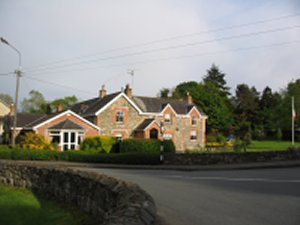
The Olde Post Inn in Clover Hill
The trip began very well with a meal and an overnight stay in Gearoid Lynch’s Old Post Inn in the little village of Clover Hill in County Cavan.
I knew that Gearoid was a member of Euro-Toques but really nothing else about him. My expectations weren’t particularly high but I knew that, as he was a member I would at least dine well.
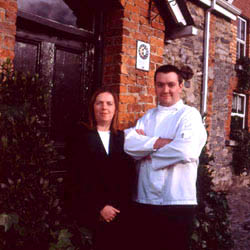
Gearoid and his wife Tara
We did better than dine well. Gearoid, as it turned out, cooks the must beautiful food. His pedigree is impeccable having trained with both Kevin Thornton and John Howard (Thorntons and Le Coq Hardi), he has absorbed the best of the old and the new.
His terrine of Bacon and Cabbage and his fabulous Chocolate Tart alone would have been “Vaut le Voyage”.Go there soon before it gets too busy.
His number is 0047 55555.
The following day we were in Castle Leslie in County Monaghan. I have known Castle Leslie now for a long time but since Paul McCartney decided to have his wedding reception there it is having a great renaissance.
The Painted Gallery has now been renovated and is beautiful as is the new conservatory but I am glad to report that the eccentric heart of the house remains as attractively quirky as ever.
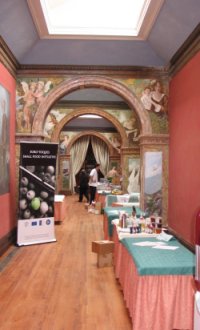
The Gallery setting up for the Food Initiative
We were in the Castle for a Small Food Initiative which was very ably organised Euro-Toques own Abigail Colleran. This was spotlighting some of the small food producers in the region (both north and south of the border) and introducing them to us chefs.
There was tremendous food on offer, it would be invidious to pick anyone out, I grazed extremely well and then fed well on a spit roast pig which was cooked in the conservatory for the occasion.
A further highlight to my day was that I had the job of giving Veronica Steele a lift back to Dublin. Now Veronica is recognised as the mother of Irish Farmhouse Cheese as the one who set that whole ball in motion with her delicious Mileens in the late seventies.
It is a pleasure to talk to Veronica,( who has now passed the business on to her son,) she is an learned student of cheese ,both its history and its chemistry. and she has managed to retain her enthusiasm for the subject after years of cheese making.
The trip to Dublin was over too soon.
1 comment.
Hibiscus
May 21, 2005
06:48 AM
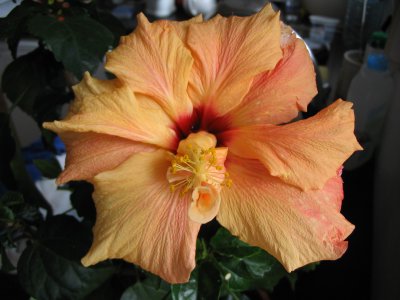
As I already mentioned I got myself my first Digital Camera last week and having spent the week snapping everything I have taken tha first picture that I like.
This is a Hibiscus that our friend Finola gave us last year.
Because Sile has amazing green fingers it seems to spend most of its time in flower.
The camera has a little button with a flower on it which I pressed before I took the photo. Caitriona tells me this is the macro setting.
The camera is a Cannon Sureshot and I bought it from Amazon because it was cheapest there.
Sisters
May 20, 2005
12:33 PM
When roused to great heights of sororial affection my sisters have been known to break into “Sisters” a song which featured in the old Bing Crosbie film “Holiday Inn”. I caught them at it last wednesday.
Sisters, Sisters
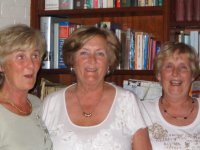
Never were there such devoted sisters
Never had to have a chaperone, no sir
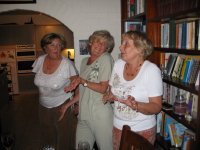 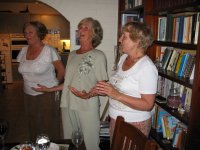
I’m here to keep my eye on her
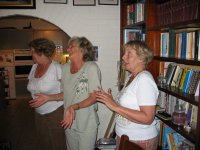 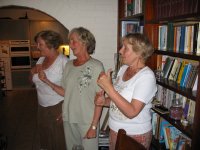
Caring, sharing every little thing that we are wearing
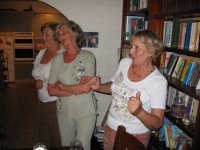 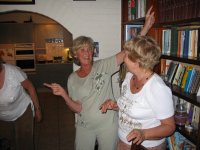
Many men have tried to split us up but no one can
Sorry the quality of the pictures is rubbish. I still can’t make a .jpg out of a .doc
Fear not. Caitriona will be down at the weekend and I hope I’ll get a quick tutorial.
Watch this space for a dramatic improvement
she came and she did!
Poem for the Twins
May 19, 2005
23:37 PM
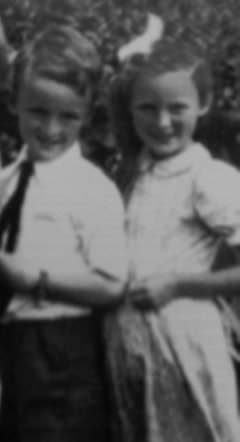
David and Fifi aged about 7
Last Tuesday 17th May my twin brother and sister, Felicity (better known as Fifi)and David celebrated their 60th birthdays.
My mother, just before she died, had told me the story about how the twins changed position just before they were born.
On last Wednesday night my sister D gave a party for the brothers and sisters in her house in Fountainstown. I did most of the cooking but also felt I should write a poem.
Fifi, as soon as she arrived at the party said to me “I hope you arn’t going to tell that story about how I shoved David out of the way to get out first”
“I’m not” said I with perfect candour.
Read the poem and you will understand that I didn’t lie.
In 1945 there were no scans so twins nearly always came as a surprise.
In May Dr Kearney, my mother’s obstitrician had said to her:
“The child has a big head, the birth may take a while”
The child born on 17th May didn’t have a big head, it was a girl.
It was only then that they realised that there was another baby on the way.
He had a bigger head .He was a boy.
In 24 hours the girl had changed position with the boy and got out first.
May 17th 1945……………………………….The True Story
They were snuggled together Fifi and Dave
Together like spoons inter-curled
When the birthing pains started, their signal to leave
Their moment to enter the world
Now their waiting was over, their time at last come
Felicity trembled with glee
At last they were going outside of the womb.
“Let me out ! Let me pass, Let me see!
But David, the brother, he guarded the gate
Kept the world out and his sister in
Keeping them safe for this very date
When the rest of their lives would begin
And now Fifi wanted to lead the way through
She hungered to taste liberty.
But Dave held the door, he was head of the queue
With him there, she could not be first free
David looked at his womb mate, his sister, his twin
He smiled at her most tenderly
He pulled himself back and he sucked his breath in.
“Would you like to go out first “? said he.
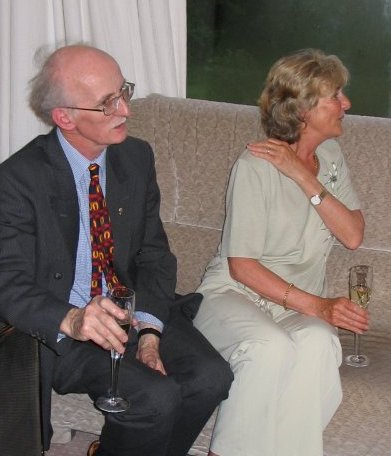
David and Fifi at D’s party on the 18th May
Level C
May 18, 2005
12:28 PM
Text messaging on the mobile is, I reckon, for the under thirties. Not that I don’t text constantly, I do but I make a pedantic point of spelling every word fully and punctuating as if I were doing an english essay for the Inter. Not for me the c u 6 🙂 school.
I was coming back home on the bus last week from a conference in Spain. When I got to Carlow I texted Sile to say I had got so far, and was knackered having at that stage been travelling for 12 hours non stop.
Her verbatim reply (It is still in my phone) was:
“Let me know when at level C I will try and park near the church”
I looked at it with some astonishment. Was she waiting until I reached higher plains of exhaustion before burying me?
How did I calculate my exhaustion levels alphabetically?
Then the penny dropped.
But I replied faciously:
“Am working at my breathing but am only on level B, will try and get to level C by Waterford”
This of course entirely mystified Sile.
Her original reply to me had absolutely nothing to do with breathing levels. She was merely telling me to text when I got as far as the level crossing just outside Waterford to let her know so she could then leave the house and pick me up on time.
I made sure that that happened by sending her a triumphant “ I have done it, am at level C ” as I passed over the level crossing.
She, being a lady of infinite patience , picked me up on time anyway.
On Air
May 17, 2005
19:26 PM
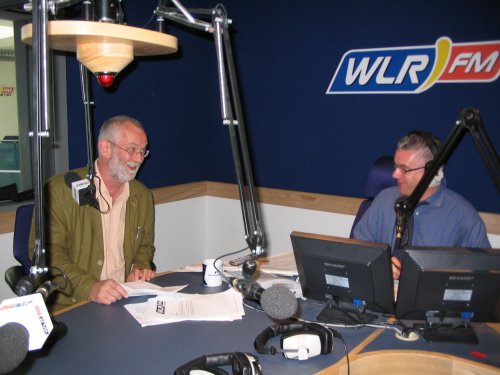
Billy McCarthy and myself broadcast “Food Matters” on WLRFM
When I was about 13 and in “The Loft”-the Cork Shakespearean Society- someone from Radio Eireann came up and talked to us about being on the radio. The wanted to interview some of us for a programme called something like Children at the Microphone. This woman talked to me about various things but what she was most interested in was a holiday we had taken in a horse drawn caravan. She promised to get back to me to organise a time to go down to the studio and record this interview.
I was of course on air to be on air. Fame at last. I told everyone and then waited for the call.
It never came.
I just had to duck the head and avoid all references to radio in conversations. This disappointment made me a frustrated radio star.
I definitely harboured notions of getting on air.
I had a couple more brushes with the media over the years, most notably with Saor Raidio(sic) Connemara (which is another story) but nothing to satisfy my yearnings for radio fame.
In October 1989 we started Dwyers Restaurant. By May of 1990 we realised that some drastic action was needed to keep the business going. The advice was we needed to advertise, people just didn’t know about us.
Advertising is not cheap, that was the moment I thought of killing two birds with one stone. If I could get a cookery slot on the radio I could get some much needed advertising for free, and satisfy my ambitions for airway exposure.
WLR, Waterford Local Radio, stopped being a pirate and became official at around the same time that I started the restaurant. I had met some of the DJs and plucked up the courage to approach one to find out about my chances of getting a slot.
I turned out to be the right person in the right place and at the right time.
The following week I was doing a piece in Billy Mc McCarthy’s Deise AM programme, this was on Tuesday 4th June 1990, just nearly 15 years ago.
That means that Billy and I have been looking at each across the deck of the studio for the last 5,250 Tuesdays.
Or to put it another way I have roughly given out 15,750 recipes to the long suffering people of Waterford.
Scary isn’t it.
I suppose the main result of my achievement of my long held ambition to go on air was that it did make an impression on the people of Waterford.
Quite a few of them came in to eat and to see “yer man on the radio”.
15 years later we were still in business and I was still on air.
The other, and I swear unexpected effect was that I gained a small bit of celebrity status. It being radio, this meant that I was never recognised until I opened my mouth. These recognitions happened so rarely that they became pleasures instead of nuisances.
Like the time the man in CIE enquiries when I asked him the times of the Dublin train said “I know that voice”. Obviously it requires a certain very receptive ear to recognise someone just by their radio voice. Sometimes you would be half way through a monologue in a shop, faced by a puzzled assistant, who’s brow would suddenly clear and he would say
“You’re that cookery chap aren’t you?
My best two stories were ; recently when I was going on a Glass Society week end I bought a return to Belfast in the station for the early train.
Looked around in vain for my friend Eamonn, a glass engraver, who was travelling with me, I decided to board anyway. When my friend finally joined me in the carriage he said “Do you know that man in the booking office?”
I didn’t. Neither did he. But apparently when he ran in –just on time- to buy his Belfast return he was told “ You’re late. Martin Dwyer has been waiting for you for the last ten minutes!
But my best moment of recognition happened about 2 years ago in Charleroi Airport. I was coming back to Dublin after various meetings in Brussels and realised that I wasn’t going to be in time to catch the last bus home. I was chatting, quietly I hope, to my colleague , another Irish Chef, when we heard a lady in our vicinity coming up with the immortal words
“I know that voice”. (We were remember in Belgium!)
It was, you’ve guessed it. A citizen of Waterford. And furthermore one who was being picked up in the airport by her son and driven back to Waterford that night. “Would I like a lift?” Would I what.
A little celebrity is a wonderful thing.
The Garden Shed
May 16, 2005
14:47 PM
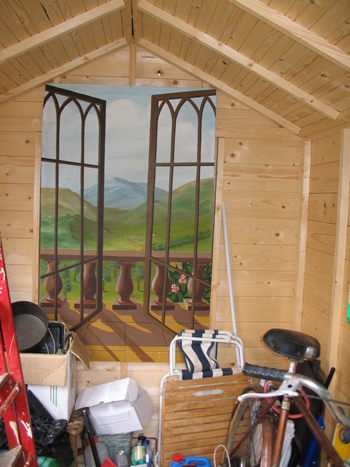
When we opened the restaurant first we had a small windowless room at the back which was a problem area. We decided to give the illusion of a window by putting a large trompe l’oeil painting on one wall and framed and curtained it like a window. This idea we pinched directly from an interiors magazine and just got someone to copy it for us.
It worked very well to ease the claustrophobia of the room.
It got discarded over time but I was always fond of it and brought it with us to our new house where it now hangs at the back of the shed.
Yesterday I got a new digital camera and took a photo of it.
I think it lifts the shed too.
The Wife of Bath
May 14, 2005
09:12 AM
The notion of gap years in a career was not totally invented by the present generation. After about two and a half years in our first jobs in Dublin, mine in Snaffles as a chef, Sile as a teacher in Basin Lane we decided to throw all up and head for the world outside while we still had the liberty to do so. We had a brief sojourn in France (and that’s another story) but ended up in London (which seemed quite as far away as Australia does today) in 1974 full of equal measures of fear and hope.
I had a letter of introduction to Margaret Costa, then cookery editor of the Observer and a godmother to my friend Stephen Pierce of Shanagarry. Her husband had a restaurant in central London called Laceys, very up market and very busy, they agreed to give me a try.
I lasted one night.
I blame neither them nor myself for that. My experience to date had been spotty in the extreme. I was badly in need of some further training before I could call myself a chef.
It was beginning to look like we would have to turn tail and try and creep back to Dublin and our former lives when we (i.e. Sile ) stiffened our backbones, gathered together our remaining funds and decided to give England a decent shot.
My restaurant guide bible at that time was (and still is) the Good Food Guide. We went through it with a fine tooth comb and picked out about 30 restaurants or small hotels where we felt we might fit in and learn something. We wrote them an honest letter, indicating that we were keen but little else and then sat back and waited to see if we would get any replies. Incredibly we got about 28 encouraging letters.
Most of them were very polite refusals, about ten were job offers of various sorts. Our confidence, which was just about at bottom, soared.
We picked out the two most tempting offers, one in Kent, one in The Lake District and made arrangements to be interviewed in both.
The Wife of Bath in the tiny village of Wye in Kent was our first interview.
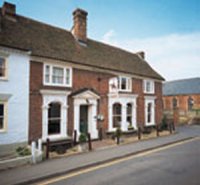
The Wife of Bath Restaurant
When we got there the door of the restaurant was answered by a scrawny lanky man in a very torn jumper who I assumed to be some sort of a gardener. Of course he turned out to be the proprietor, Michael Waterfield.
After talking to him for a few minutes I knew that I wanted to work here more than anywhere else. This man was, and still is, the most gentle, unassuming man I have ever met in a kitchen. As proprietor of a restaurant, which was at that time recognised as one of the top ten in England, he had none of the characteristics of a prima donna chef.
Michael ran his kitchen with kindness and understanding, he never raised his voice, didn’t know how to be sarcastic, and still produced marvellous food. He became, and still to this day is, my role model of how a kitchen should be run. He had a job for me in the kitchen and one for Sile working in the little bar taking the diners orders.
The Wife of Bath was called that after the character in Chaucer’s Canterbury Tales( we were very close to the Pilgrims Way) and also because Michael’s wife Hilary came from Bath.
Sile, being the sensible one insisted that we still should go to Grasmere to
the small hotel “Michaels Nook” where we had our second interview.
We had a long and torturous bus journey to Cumbria, and discovered when we got there that it would have been a most acceptable job but after meeting Michael Waterfield there was no competition.
We blew the last of our money by getting an express train back to London and arrived in Wye the following day, broke but looking foreword to our new life.
It didn’t disappoint us. We were to spend a most happy two years there.
As I said Michael was running one of the most renowned restaurants in England of the time. He had trained, like so many of his successful chef colleagues, under George Perry Smith in “The Hole in the Wall” in Bath.
Perry Smith is reckoned to be the man who translated the ideas of Elizabeth David into food for restaurants and was responsible for the huge raising of standards in catering in England, the reverberations of which can be felt in modern Britain’s culinary confidence and skill.
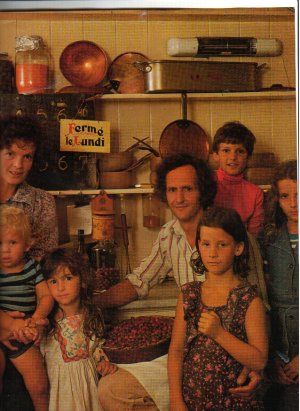
The Waterfield Family in the kitchen of The Wife of Bath
Pictured in Vogue Magazine in 1976
It was an exciting time to be in a kitchen in England, and Wye was a great village to live in.
The village was just a short train journey from Canterbury and about 90 mts by train from London. We actually could (and did) go to the theatre or cinema there and get the last train home. The Kent coast was about 30 mts away and Bob, the other chef, brought us to swim in Sandgate any hot afternoon when we were free.
Village life in England was a very new experience to us. For a long time we thought the villagers were cold and unfriendly. This was the time of the height of the IRA campaigns in England so we weren’t pushing ourselves forward anyway. By coincidence, at that time someone in Ireland sent us a copy of Hibernia magazine. There was an article in this written by an Englishman who moved to the west of Ireland who couldn’t get over how friendly (intrusive?) the natives were. The explanation was quite simple. English people thought it impolite to ask new comers about themselves, Irish people thought it impolite not to.
After 18 months in Wye our first daughter Caitriona was born and we were overwhelmed by the reaction of the villagers. They queued up at our door to bring presents, we bought absolutely nothing for the baby as everyone had hand me downs they were only too keen to give us.
We had been accepted and now they were only too happy to be friendly.
I doubt if we would have met with such kindness in a similar Irish village.
Thinking back on it all now I find it strange that I have no memory of ever being homesick while we lived in Wye. We made lots of friends there. Bob and his wife Janet were very kind to us and entertained us frequently and generously. We were much taken by the Waterfield family,
Michael kindly agreed to be Caitriona’s godfather, and Olga Wills, an Irish ex-pat like ourselves, agreed to be her godmother.
However it was the excellent , honest and simple food that is my best memory of our time in The Wife of Bath. While we were there Michael was updating his great Aunt, Janet Ross’s Italian cook book, “Leaves from a Tuscan Kitchen” for Penguin Books.

My very battered but much loved copy of “Leaves”
This wonderful little book on cooking vegetables was quite a revolutionary volume in the early seventies. It is amazing to see how it captures the simplicity of Italian cooking a full 25 years before the great success of The River Café.
The Wife of Bath was a very successful restaurant, we used to entertain the then prime minister Edward Heath quite often and on one historic occasion had Elizabeth David herself for lunch.
After two years we felt the time was right for us to come home so, in March 1977 we packed all our hand me downs together and sailed with Caitriona on the Inisfallen back to Cork. Our time abroad was only ever intended to be a few years, we knew that we wanted to bring up our children in Ireland but still we left Wye with real regret.
Retirement
May 6, 2005
09:40 AM
To be retired is to have the leisure to to do the sort of things you always wanted to do before but never had the time to.
For example over the last fortnight I have provided an image for each of the listings in my Some of my favourite things entry. This has made me fairly nifty with the computer but, chiefly, has been great fun, check it and see.
Tree Tops
May 3, 2005
22:00 PM

This is a picture of Tree Tops as it is today.
It is for sale (with its last remaining acre) for 1.5 million Euro!
I was born in my Mothers and Fathers bedroom, in 1949, in our house in Cork. This was to remain my home until I moved out myself in the late Sixties.
Tree Tops, as it was called, was a huge, if not particularly aesthetically beautiful house. It was beautifully situated in Tivoli, up over the Lee with a long panorama down the river to the spire of Pugins cathedral in Cobh.
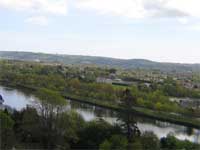
The view from Tree Tops today
The house itself was a bit of an architectural patchwork. It had started it’s life as a four bedroomed detached suburban villa in 1939 when my parents had had it built at the time of their marriage.
As their family started to grow they built extensions on each side of the house, fully doubling its size, and ended up with a fairly vast seven bedroomed mansion by the time I was born.
What they were looking for with these extensions was more bedrooms both for the growing number of children and for the live-in staff. (Having live in staff was a not exceptional middle class practice in the forties and fifties)
Bedrooms were , the times again decreed, upstairs, so my parents were faced with large downstairs acreage to fill to give the bedrooms something to sit on. This gave us a very large kitchen with two pantries,both in themselves the size of a modern kitchenette,it created a huge dining room down a long corridor which was fairly impossible to heat and used only for state occasions by us children, or for watching television , wrapped in an eiderdown, by hardy television addicts.
(Maybe I should thank my parents for thus giving me an aversion to television which persists to this day)
The old dining room became the Breakfast Room and this was used by us children until we were reckoned to be sufficiently civilized to join our parents in the Dining Room. (as the youngest of the seven I don’t ever remember making it)
The other ground floor extension became the Billiard Room( I apologise if this gets to sound like Cluedo). This room was huge and quite my favourite room in the house. It did, for a time, even have a billiard table, around which we played boisterous games of “roll the red” and the odd game of snooker or billiards. But then times got hard and it was sold off.
The room became my “house” while a child. There I would create a den, enclosed by chairs and rugs and be blissfully forgotten by my brothers and sisters.
It was of course a terrific room for parties and my older brothers and sisters used to hold Christmas Dances there in the years of affluence.
The excitement before these was immense. The room, having been totally de-cluttered, was turned into a sort of grotto with lights and decorations and , the bit I loved best, crystals were put on the floor.
These crystals were, I suppose, a kind of French chalk designed to make the wooden floor sufficiently smooth and glassy so that the waltzing , fox trotting and cha cha cha ing couples could glide gracefully over its surface. The day before the dance I would be given the job of rubbing in the crystals. First I would have to sprinkle the crystals all over the billiard room floor, then , with my shoes bound up in old cloths, I would have the time of my life sliding and skidding along the floor to my hearts content, Of course the more one glided and skidded the more slippery the floor got so that , by the end of the day, this became an exercise remarkably akin to ice skating.
On one occasion I got such an intense polish on the floor that the first few couples collapsed ignominiously on their bottoms and some salt had to be applied on top of the crystals so dignity and equilibrium could be maintained.
The same billiard room also became the venue for my three sisters weddings. Incredibly the room was able to fit the several hundred guests invited for what was then known as the “Wedding Breakfast “ (this even if it happened in the afternoon.)
However the real attraction of Tree Tops lay not in the house but in the garden. This was my Mothers domain and like the house was of huge size. All in all the house came with about 7 acres of grounds. A luxury even in the mid 20th century, and all this within in 2 miles of the centre of Cork city.
The house was built on a hill which was terraced in front of the house to provide us with a tennis court, some wonderful sloping lawns and, my mothers pride and joy, a rock garden. The tennis court was well used by the family All the siblings (with the exception of me, the youngest) became competent tennis players and two, my brother George and sister Fifi, played well.
The rock garden I dreaded as that was entirely under the control of my mother. (The two full time gardeners, being principally in charge of fruit and vegetables recognised the rock garden as being outside their remit)
My Mother spent many hours endlessly weeding the rock garden and would enlist any passing child as a helper to work at this Sisyphean task.
I must confess that she has given me a lifelong hatred of rock gardens and of alpine plants.
All the land behind the house was devoted to the kitchen garden. There we grew all the vegetables the household could need. There was always a plentiful supply of the basics like potatoes, carrots, onions, and cabbage.
The more exotic choices would come on stream in the summer when the tiny peas and the asparagus would fruit and I particularly remember the flavour of the first little new potatoes. These would be on the table within hours of being dug and I have never tasted better.
A lot of fruit was also grown at the back of the house. We must have had about 50 apple trees, both cookers and eaters. One particular beauty which yielded a huge crop of small sweet yellow/green eaters was of unknown origin as it had come to us as a stake to support another apple tree. The supported had died away but the mysterious and anonymous supporter had flourished and became the best yielder in the orchard.
There were also plentiful supplies of pears, plums and, in the green house the most marvellous white peaches.
Our abundance of soft fruit was such that quantities of it were sold to greengrocers in the town in summer.
Raspberries were my mothers particular passion and there was always a huge crop waiting to be picked in season. We were paid about 3 pence a pound to pick these (I don’t think my mother got much more from the shops) so we could always earn a few bob by putting in the time on the canes.
As well as raspberries there were also variations like white raspberries and loganberries on the canes,plenty of strawberries and bushes of bitter green goosberries which we were told would give us stomach ache if over indulged in.
The other selling crop was early tomatoes in the greenhouse. The combination of the scent of ripening tomatoes and white peaches from the greenhouse created the most beautiful perfume,and either smell, encountered today, trigger my recollections of times past just as Proust’s madeline did.
The other significant produce from the kitchen garden were the herbs. I was forever being sent up the garden for a bunch of parsley, a sprig of thyme, a few chives, or to dig up a bit of horseradish to add fire to the Sunday roast. This area also housed the chicken run. We must have had several dozen chickens running around their enclosed run at any one time.
These ate all the household scraps and provided us with terrific eggs and wonderfully flavoured boiling fowl which was another Sunday dish served with a boiled ham and parsley sauce.(Another Proustian taste for me).
There were , as I have said, two gardeners looking after this abundance.
Bill was the younger of the two and also the more senior in rank, Jack was a little down the pecking order and did the rougher digging and hoeing. Both of them were kindness itself to us children and we spent countless hours talking to them as they worked. Bill would tell us tall tales of returned Yanks and his childhood in rural, now suburban Glanmire.
To the east of the house a drive way climbed up to the yard. At least we called it the yard. My Father always growled and said it was not a yard, we did not live in a farm, it was a car park. Here the gable wall had no windows and this provided us with the sport which most occupied our youth. We used this area to play tennis up against the wall. The wall was configured , as if deliberately, to impose exacting rules on this play.
The first three feet was smooth concrete and any ball that hit this area was deemed to be in the net and not allowed. The next eight or so feet up were pebble dash and from this surface the riccochet of the ball was completely unpredictable. This presented the players with a challenge as great as that of a skilled opponent. The rest of the height of the wall was tiled in great soft green tiles. From this there was little or no rebound,and more importantly they were sufficiently fragile that a ball hitting them at any speed would shatter them with a loud crack and then there would be the devil to pay.
This made us keep the ball both over the “net” and ensured that it didn’t go too high to be out of court. Something , in fact, like tennis. No wonder that some of the family became proficient at the real thing.
Above this area was meadow, about two acres of it, with some great trees from which swings could on occasions be hung. My parents, sporty types to a man, had levelled out a small putting green in the middle of this which would enjoy an occasional vogue with us children. What I loved about this whole area was that the grass was allowed to grow freely here in the summer. This provided me with a vast secret garden where you could remain hidden by the long grasses for as long as you liked. In fact by crawling between the grass I could and did create whole towns and mazes of streets and passages where I could escape from the most persistent brother or sister.
The remaining area of land, which fell outside the garden proper, was known as the field. The principal use for this land as I was growing up was for the two horses and a donkey which we gave a home to at various times. I suppose I must have ridden one or other of them sometime but can no longer remember.
I remember this field as a place where there were great bare scrubby acres
where you could walk alone to your hearts content. Where large stones could be turned to see the incredible activity of the ants as they moved the precious eggs underground, where in autumn the blackberries were so prolific that we never had to travel further afield to make our years supply of blackberry jelly and jam.At the very top of the field there was the very best view from the garden. This vista was used by John Hinde as a view of Cork harbour in his post card series.
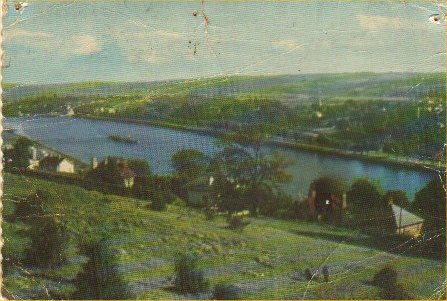
My old and battered version of the John Hinde Post Card
(If you look very carefully you can see our two ponies in the bottom right hand corner)
I don’t suppose anyone truly becomes detached from those places where we spent our youth, despite our best efforts. When I started writing this piece I thought of it as one piece about the many places where I had lived. Tree Tops took over and demanded a full piece for itself.
I had a pretty idyllic childhood in Tree Tops. The house and the garden were always my refuge and comfort.
The family sold the house and the field in 1972 and bought a house very close by. I had moved away at that stage and thought for a long time that the house meant nothing to me.Writing this has proved me wrong.
1 comment.
|
